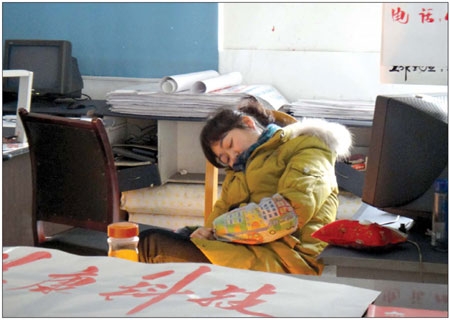Home comforts win over city lights
Updated: 2011-02-11 11:05
By Zhang Jing (China Daily European Weekly)
|
 A recruiter falls asleep at a job market in Chengdu, capital of Sichuan province. Zhang Jing / China Daily
|
Many migrant workers are opting to move near their hometowns from more affluent coastal areas
Watching snowflakes fall outside the window, Xu Ling, 46, a nanny in Chengdu, capital of Sichuan province, is glad she did not accept a job offer elsewhere.
"If I were working in Shanghai now, I would be worrying about how I could get back home for the Chinese New Year," she says.
"But now it will only take me 45 minutes by electric bike to Shuangliu county, where my family lives."
The prelude of China's annual chunyun, a nationwide migration for Chinese New Year, started on Jan 19. About 2.85 billion person times this year traveled by train, by air, and by bus to get back to hometowns to celebrate the Year of the Rabbit, which started on Feb 3, according to the Chinese calendar.
"I watched on TV that a lot of people have been stranded in the airports of Shanghai and Hangzhou because of snow. And train tickets are so hard to get that people need to line up for days. I am free from all these worries and trouble. Plus, I have saved as much as 1,000 yuan (114 euros) for the return tickets."
The family Xu stays with gives her 3,000 yuan a month, besides free meals and accommodation.
"The monthly wage a Shanghai family offers is 500 yuan higher, but on the other hand, the cost of living is so much higher.
"To me, money is not everything. What is more important is, I can stay close to my family. Whenever my daughter needs a helping hand, I am reachable. But if I stay in Shanghai, I can only come back once a year if I want to save on train fares."
Xu is one of thousands of migrant workers in Sichuan who have chosen to stay close to their hometowns rather than migrate to affluent coastal provinces such as Jiangsu, Zhejiang, Fujian and Guangdong.
Deng Chaoping, a taxi driver in his 30s from nearby Jintang county, says: "Here in Chengdu, I can earn as much 4,000 to 5,000 yuan a month. I wouldn't care to go to Guangdong, where I don't speak the dialect and where I know nobody."
Zhang, a construction worker from Nanchong, has a truck of his own that he uses to transport his father and work partner next to the driver's seat.
"It's outdated to think of migrant workers as poor," says Zhang, wearing Nike sports attire.
"I have a Lenovo PC at home and in my spare time I surf the Internet with broadband. We don't need to go to Shanghai or Beijing for more job opportunities. I have been kept very busy."
Hundreds of cranes stand tall in the skyline of Chengdu. It is said a construction worker can earn up to 100,000 yuan a year. A carpenter would have cost 100 yuan a day in 2009 but the price went up to 150 yuan in 2010. Zhang says some labor contractors from Jiangsu got flat refusals when they came to Sichuan to recruit workers with an outdated price.
Jiuyanqiao Labor Market, situated next to a Toyota Lexus 4S shop on the outskirts of Chengdu, covers a 6,498-square meter area. Job postings include 3,000 to 6,500 yuan a month for an electronic welder, and 2,000 to 3,500 yuan a month to park cars.
Qunkang, whose parent company is Foxconn, a Taiwan-based leading manufacturer in TFT-LCD, is recruiting 10,000 workers in Chengdu and paying 1,640 yuan for a month's wages, while that in Shenzhen is only 600 yuan higher. The price does not seem attractive enough as piles of its ad flyers lie on the table untouched and one of its recruiters fell asleep as the day has been too idle.
In many ways, to live in Chengdu, an inland city, is not much different from living in Beijing or Shanghai. An 18-km-long subway opened in September 2010. Passengers need to check their bags through X-ray machines before swiping their electronic cards to get in. Advertisements are flashing on 30-inch TV screens in the brand new tunnel with marbles and escalators.
There are HSBC and Standard Chartered bank branches and there is an Ikea, which sells exactly the same goods at the same price as in Beijing. Luo, 60, travels with her daughter for two hours on weekends by train from Chongqing to Chengdu, for the simple purpose of shopping at Ikea.
"I wish there was an Ikea in Chongqing. It has so many things in strange shapes and designs," Luo says.
In the nearby Jintang county, about 50 kilometers from Chengdu, a second international airport is being planned, reports Chengdu Daily. When it is completed, it will have six runways and a maximum annual capacity of transporting 80 million person times as well as 2 million tons of cargo, four times than that of the current Chengdu Shuangliu International airport. It will then be the biggest logistics hub in western China.
Professor Chen Zhiliang with Renmin University of China says: "The table has turned. Previously, labor in the western part of China would flow to the eastern part for more job opportunities and higher pay. It is estimated there were once more than 130 million migrant workers in the country. But now the coastal areas have a labor shortage.
"The world financial crises in 2008 and 2009 sent a large number of migrant workers home as there weren't enough orders for export-oriented coastal companies. And recently, the western areas have shown strong momentum in development, while rising prices of agricultural products have also played an important role in getting workers to stay at home."
The National Bureau of Statistics published on Jan 20 that the net income of rural residents in 2010 has grown by 10.9 percent, while that of urban residents by 7.8 percent. This is the first time since 1998 that the former has surpassed the latter.
As labor costs and land prices keep rising in coastal areas, many companies have restructured their development strategy by setting up factories in the west, while maintaining R&D and marketing departments in the east. Local governments near the coastal areas such as Anhui, Henan and Jiangxi have spent tremendously on billboards along the highway to call for investment and sent representatives to lobby for favorable conditions.
Aokang Group, China's largest shoe manufacturer, invested 1 billion yuan and moved its factories from Wenzhou, Zhejiang province, to Bishan county of Chongqing in 2004. According to Zhou Panshan, Aokang's manager in Chongqing, the factory in Bishan produced 1.42 million pairs of shoes in 2010 and the number will reach 100 million pairs by the end of 2011 with an output value of 10 billion yuan.
Nie Xurong, a Sichuan shoemaker, moved with Aokang to Chongqing. "I am very happy about the move as now it's only two hours away by bus from my hometown in Nanchong," Nie says.
"Previously, my wife looked after our children by herself and I only came back once a year during Chinese New Year. Now I can spend more time with my family."
Nie is even happier that he can now transfer his endowment insurance in Zhejiang to Sichuan. Starting from Jan 1, 2010, a new policy regarding the inter-provincial transfer of endowment insurance took effect. China still practices a strict policy of residence registration. This regulation has streamlined the process and made it possible for individuals including migrant workers to transfer their endowment insurance to a different province at the same time when they relocate.
Zhao Shukai, a Harvard Kennedy School scholar and senior researcher in rural economy and democracy with the Development and Research Center of the State Council, said at a forum: "The labor shortage is in its essence a labor rights shortage.
"It's long been known that migrant workers are underpaid. They work overtime under poor working conditions and they don't have a sound social security system to protect them. On the other hand, migrant workers are poorly educated. When industries upgrade, migrant workers without enough training or skills can no longer keep up with the growing business, inevitably resulting in a structural labor shortage.
E-paper

Car sharing helps ease holiday woes
Many car owners offering paid lift services during the Spring Festival rush to reduce their own costs of driving home.
Preview of the coming issue
Global marketplace
Right on cue
Specials

Spring Festival
The Spring Festival is the most important traditional festival for family reunions.

Top 10
A summary of the major events both inside and outside China.

China Daily in Europe
China Daily launched its European weekly on December 3, 2010.
